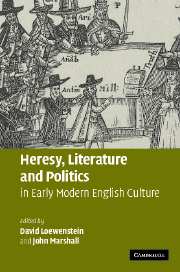Book contents
- Frontmatter
- Contents
- Acknowledgments
- Notes on contributors
- Introduction
- 1 Writing and the persecution of heretics in Henry VIII's England: The Examinations of Anne Askew
- 2 Anabaptism and anti-Anabaptism in the early English Reformation: defining Protestant heresy and orthodoxy during the reign of Edward VI
- 3 “Godlie matrons” and “loose-bodied dames”: heresy and gender in the Family of Love
- 4 Puritanism, Familism, and heresy in early Stuart England: the case of John Etherington revisited
- 5 A ticklish business: defining heresy and orthodoxy in the Puritan revolution
- 6 Thomas Edwards's Gangraena and heresiological traditions
- 7 “And if God was one of us”: Paul Best, John Biddle, and anti-Trinitarian heresy in seventeenth-century England
- 8 The road to George Hill: the heretical dynamic of Winstanley's early prose
- 9 Milton and the heretical priesthood of Christ
- 10 An Historical Narration Concerning Heresie: Thomas Hobbes, Thomas Barlow, and the Restoration debate over “heresy”
- 11 Defining and redefining heresy up to Locke's Letters Concerning Toleration
- 12 “Take heed of being too forward in imposinge on others”: orthodoxy and heresy in the Baxterian tradition
- Index
7 - “And if God was one of us”: Paul Best, John Biddle, and anti-Trinitarian heresy in seventeenth-century England
Published online by Cambridge University Press: 20 February 2010
- Frontmatter
- Contents
- Acknowledgments
- Notes on contributors
- Introduction
- 1 Writing and the persecution of heretics in Henry VIII's England: The Examinations of Anne Askew
- 2 Anabaptism and anti-Anabaptism in the early English Reformation: defining Protestant heresy and orthodoxy during the reign of Edward VI
- 3 “Godlie matrons” and “loose-bodied dames”: heresy and gender in the Family of Love
- 4 Puritanism, Familism, and heresy in early Stuart England: the case of John Etherington revisited
- 5 A ticklish business: defining heresy and orthodoxy in the Puritan revolution
- 6 Thomas Edwards's Gangraena and heresiological traditions
- 7 “And if God was one of us”: Paul Best, John Biddle, and anti-Trinitarian heresy in seventeenth-century England
- 8 The road to George Hill: the heretical dynamic of Winstanley's early prose
- 9 Milton and the heretical priesthood of Christ
- 10 An Historical Narration Concerning Heresie: Thomas Hobbes, Thomas Barlow, and the Restoration debate over “heresy”
- 11 Defining and redefining heresy up to Locke's Letters Concerning Toleration
- 12 “Take heed of being too forward in imposinge on others”: orthodoxy and heresy in the Baxterian tradition
- Index
Summary
Pull one keystone from the edifice of Christianity and the rest will follow, all the way to the dissipation of the church into so many “sects of one.” This was the now famous fear of Bishop Fisher in the sixteenth century. Any part of Christianity that was not apparently justifiable from scripture was vulnerable. In this respect, there are several early modern views that are logical consequences of Protestant biblicism, but which were nonetheless unacceptable to Protestant state churches, and many or most Protestants who had put themselves outside of a national church. One of these was mortalism, the belief that the soul remained with the body after death and waited for the general resurrection. “Soul” (psyche), it was argued, was a Greek concept and had no basis in the Old Testament, which really described monist man: a single substance into which life was breathed by God. However shaky English mortalist argument was between 1550 and 1650, it became a powerful intellectual position in the following century, in particular attracting many philosophers of the new science.
Perhaps even more important in this respect than mortalism was anti-Trinitarianism. Like mortalism, it represented the revival of an ancient idea that had been demonized as heresy in the early church, a demonization reaffirmed by the Reformation churches. One way or another, it affirmed that the idea of the Holy Trinity – wherein the Godhead was made up of three parts, Father, Son, and Holy Spirit – was false.
- Type
- Chapter
- Information
- Heresy, Literature and Politics in Early Modern English Culture , pp. 160 - 184Publisher: Cambridge University PressPrint publication year: 2006
- 10
- Cited by

